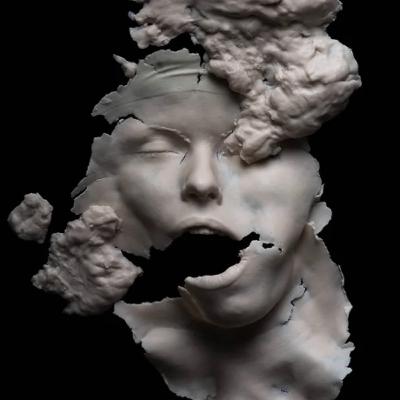Discover WAKE ISLAND
WAKE ISLAND

57 Episodes
Reverse
Enter the Amity-verse with Wake Island.
In this episode we get into channeling dark energy from the media vortex surrounding America’s most infamous haunted house in Amityville, Long Island.
In addition we also talk about: Hauntings as a manifestation of trauma, the mythology-making behind the nearly 50-year Amityville horror house phenomenon, demonic media spectacles, the allure and menace of the suburbs, and the reality and fantasy of demonic possession.
Jack Riccobono’s new series, Amityville: An Origin Story, is now streaming on MGM+. Riccobono has written & directed a wide range of narrative, documentary and commercial work across the five boroughs of his native New York City and around the world, from Moscow to Shanghai to Freetown, often exploring hidden subcultures and the complexities of the human soul. His critically acclaimed feature documentary The Seventh Fire, from executive producers Terrence Malick, Natalie Portman and Chris Eyre, premiered at the Berlin Film Festival and received a New York Times Critic’s Pick.
Theme music by Joseph E. Martinez of Junius
SOCIAL:
Jack's site: All Rites Reserved
David's site: raviddice.com
Wake Island Twitter: @WakeIslandPod
Wake Island Instagram: @wakeislandpod
David's Twitter: @raviddice
Daddy’s back.
ROOM TEMPERATURE, haunted houses, video games, childhood memories, publishing with an indie press, supportive teachers, Flunker, and more
Dennis Cooper's Blog.
FLUNKER, six fictions, 124 pp., c/o Amphetamine Sulphate: orders open. UK/Europe: orders open.
SOCIAL:Twitter: @WakeIslandPod Instagram: @wakeislandpodDavid's Twitter: @raviddiceDavid's site: raviddice.com
In this episode with Steve Finbow, we tease out the point at which a body ceases to be considered a person and chart the development of trauma over time, tracing the fine line between disgust and desire. We get into the motivations behind necrophilia and corpse desecration, examining the boundaries of how taboos can become normalized. We discuss the role of the soul or consciousness in elevating necrophilia to a mythic realm and the pursuit of the death drive in objects of beauty. We also consider art as both a method and a way of life, and whether societal breakdowns due to acceleration will increase instances of necrophilia in the future.
Necrophilia has shadowed humanity throughout its existence, from ancient Egypt, to the Moche culture of Peru, the exploits of the renowned Vampire of Montparnasse, the sexual murders of the Weimar Republic, through to serial killers such as Ted Bundy and Jeffrey Dahmer. This new edition of Grave Desire – with artworks by Karolina Urbaniak – delves unflinchingly into the myths, art and practices surrounding this taboo subject. Finding Juliet’s catatonic body and believing she had poisoned herself, it could have crossed Romeo’s mind to act out the unthinkable. Maybe Juliet, seeing Romeo’s corpse, considered a little sexual frottage before she stabbed herself with the phallic dagger. Repulsive yet real, disgusting and disturbing, this is an erotic book of the dead.
Buy Grave Desire from Infinity Land Press.
Steve Finbow’s non-fiction includes Allen Ginsberg: Critical Lives (Reaktion), Notes from the Sick Room (Repeater), Death Mort Tod (Infinity Land Press), The Mindshaft (Amphetamine Sulphate), Polaroid Haiku – with Jukka Siikala (Infinity Land Press), The Life of the Artist Niccolò di Mescolano (Alberegno Press). Sanbashi – a biography of the postwar Japanese photographer Toru Nakagami – will be published in 2024.
SOCIALS:
Twitter: @WakeIslandPod
Instagram: @wakeislandpod
David Leo Rice: www.raviddice.com
David's Twitter: @raviddice
From the critically acclaimed author dubbed “one of today’s finest practitioners of nonfiction” (The New York Times Book Review), a breathless true crime tale of sex, religion, and murder in the deep South.
Mike and Denise Williams had a tight knit, seemingly unbreakable bond with childhood friends, Brian and Kathy Winchester. The two couples were devout, hardworking Baptists who lived perfect, quintessentially Southern lives. Their friendship seemed ironclad. That is, until December 16, 2000, when Denise’s husband Mike disappeared while duck hunting on Lake Seminole.
After no body was found, everyone assumed that Mike had drowned in a tragic accident, his body eaten by alligators. But things took an unexpected turn when, within five years of Mike’s disappearance, Brian Winchester divorced his wife and married Denise. Their surprising romance set tongues talking. People began wondering how long they had been a couple, and whether they had anything to do with Mike’s death. It took another twelve years for the truth to come out—and when it did, it was unimaginable.
Now, the full, shocking story is revealed by Mikita Brottman, acclaimed true crime writer of the “enthralling” (San Francisco Book Review) An Unexplained Death. Through tenacious research and clear-eyed prose, she probes the psychology of a couple who killed and explores how it feels to live for eighteen years with murder on the soul.
A fascinating page-turner of modern noir, Guilty Creatures is destined to become an instant true crime classic.
Mikita Brottman is a writer and psychoanalyst living in Baltimore, Maryland. Her most recent book, An Unexplained Death, was shortlisted for the Gold Dagger Award for nonfiction by the Crime Writers Association of the UK. She has a DPhil from Oxford University and is a professor of literature at the Maryland Institute College of Art.
SOCIALS:
Twitter: @WakeIslandPod
Instagram: @wakeislandpod
David Leo Rice: www.raviddice.com
David's Twitter: @raviddice
Every city has that motel. The motel on the edge of town, the mythical place you dare not go. Logan Berry goes there.
In this episode, we calibrate a magical framework for understanding the world through a seance Logan conducted at the Skylark Motel. We get into cutting off spectral appendages, invoking chaos, exploring hoarder homes, practicing automatic writing, and Ultratheater.
Additionally, we discuss if relentless exposure to depravity makes us evil, and why occult commerce lacks the courage of its own convictions.
We also explore the possibility that these are the best times, or at least the only times we'll ever live in
Logan Berry is the author of Casket Flare (Inside the Castle), Run-off Sugar Crystal Lake (11:11 Press), and Transmissions to Artaud (Selffuck). He’s a playwright and theatre director. He lives in Chicago.
Theme music by Joseph E. Martinez of Junius
SOCIAL:
David's site: raviddice.com
Wake Island Twitter: @WakeIslandPod
Wake Island Instagram: @wakeislandpod
David's Twitter: @raviddice
Logan's Twitter: @lgnbrry
“The omnicidal will to constitute an infinite decision implies one of two things: either to kill the unfinished, or to let the unfinished kill.”
In the second part of our conversation with Jason Bahbak Mohaghegh, we delve deep into the realm of unreality. We explore topics such as the labor associated with maintaining the criminal enterprise of the dream, the suffering and expenditure associated with visionary figures like Joyce Monsuer, the allure of totalitarian seduction during times marked by the predatory and sadistic behavior of those in authority, the phenomenon of NPC culture and the detachment /neutrality it brings, the banality of repressed nerds and the enduring shittiness of the metaverse.
Jason Bahbak Mohaghegh is a philosopher, literary theorist, and professor of comparative literature at Babson College. His work tracks currents of experimental thought across the so-called East and the West, with particular attention to concepts of chaos, violence, illusion, silence, extremism, mania, disappearance, night, evil, secrecy, and apocalyptic writing. He has published nine books to date, including: Night: A Philosophy of the After-Dark & Night: A Philosophy of the Last World and Omnicide: Mania, Fatality, and the Future-in-Delirium & Omnicide II: Mania, Doom, and the Future-in-Deception, The Chaotic Imagination (Palgrave Macmillan, 2010); Inflictions (Continuum, 2012); The Radical Unspoken (Routledge, 2013); Insurgent, Poet, Mystic, Sectarian (SUNY, 2015);
He is also the founding director of the Future Studies Program (www.futurestudiesprogram.com), Programmer of Transdisciplinary Studies for the New Centre for Research & Practice, and co-editor of the "Futures Theory" and "Suspensions" book series (Bloomsbury).
Theme music by Joseph E. Martinez of Junius
SOCIAL:
David's site: raviddice.com
Wake Island Twitter: @WakeIslandPod
Wake Island Instagram: @wakeislandpod
David's Twitter: @raviddice
"Every storyteller harbours a secret desire to be the one who tells the last story, just as every maniac wishes to inscribe the last fateful madness on earth."
In this episode with Jason Bahbak Mohaghegh we walk with vertigo to summon the authors who play at the borders of insanity and intoxication. We get into the territories of the night and mania, both of which are the premise of Jason's most recent books: Night: A Philosophy of the After-Dark & Night: A Philosophy of the Last World and Omnicide: Mania, Fatality, and the Future-in-Delirium & Omnicide II: Mania, Doom, and the Future-in-Deception.
Topics discussed include: exploring the dark poetics of the avant-garde, forbidden literature, and the final words of poets that lean into the dark and speak in apocalyptic tones, manic obsession, cosmic intoxication, opium dreams, mania redeeming nihilism, standing on the threshold of the abyss, embracing relentlessness as an aesthetic to achieve undeniability, and shunning sanity in favor of embracing madness.
Omnicide is “A captivating fractal of conceptual prisms in half-storytelling, half-theoretical prose, a rhythmic, poetic, insidious work that commands submission, Omnicide absorbs the reader into unfamiliar and estranging landscapes whose every subtle euphoric aspect threatens to become an irresistible invitation to the end of all things.”
Jason Bahbak Mohaghegh's Omnicide offers readers a view into a unique philosophy of delirium, mania, and vitalist annihilation: the startling revelation that everything that is, should not be. Omnicide is a singular kind of taxonomy, a teratology of thought-creatures that dovetails around his chosen writers, from the revelatory self-abnegation of Forugh Farrokhzad to Sadeq Hedayat, the poète maudite of modern Iran. These and other “poets of the lost cause” come together in a compelling book that is a strange hybrid of Aristotle's Categories, Borges's Book of Imaginary Beings, and the Necronomicon.
―Eugene Thacker, author of Infinite Resignation and In the Dust of This Planet
Jason Bahbak Mohaghegh is a philosopher, literary theorist, and professor of comparative literature at Babson College. His work tracks currents of experimental thought across the so-called East and the West, with particular attention to concepts of chaos, violence, illusion, silence, extremism, mania, disappearance, night, evil, secrecy, and apocalyptic writing. He has published nine books to date, including: The Chaotic Imagination (Palgrave Macmillan, 2010); Inflictions (Continuum, 2012); The Radical Unspoken (Routledge, 2013); Insurgent, Poet, Mystic, Sectarian (SUNY, 2015); Omnicide: Mania, Fatality, and the Future-In-Delirium (MIT/ Urbanomic/ Sequence, 2019); and, Night: A Philosophy of the After-Dark (Zero Books, 2019); Omnicide II: Mania, Doom, and the Future-In-Deception (MIT/Urbanomic/Sequence, 2022); and Night II: A Philosophy of the Last World (Zero Books, 2022).
He is also the founding director of the Future Studies Program (www.futurestudiesprogram.com), Programmer of Transdisciplinary Studies for the New Centre for Research & Practice, and co-editor of the "Futures Theory" and "Suspensions" book series (Bloomsbury).
Theme music by Joseph E. Martinez of Junius
SOCIAL:
David's site: raviddice.com
Wake Island Twitter: @WakeIslandPod
Wake Island Instagram: @wakeislandpod
David's Twitter: @raviddice
Jarett Kobek is a Turkish-American writer living in California. His novel I HATE THE INTERNET was an international bestseller, translated into nine languages, and published in twelve countries. His other books include: ATTA, Do Every Thing Wrong!: XXXTentacion Against the World, Only Americans Burn in Hell and The Future Won't Be Long.
Motor Spirit: The Long Hunt for the Zodiac
It’s 1969. Evil lurks in California.
From a Napa County hippie child murder to Haight Street gang bangs to methamphetamine psychosis to the killing of Sharon Tate.
Here and now, in this place and this time, it’s all gone wrong.
And there’s something else, too.
How to Find Zodiac
Dear Reader,
This is not the Zodiac speaking. The one thing that I ask of you is this, please read this book. It is called How to Find Zodiac. Being that this book is about the Zodiac, it offers a new suspect. The theory is probably correct. At the moment the theory is unproven. But the idea is a bomb waiting to go massive. Can you see the flaws in the hunting method or will you just agree and say case closed. Either way one thing is true. Zodiac can never look and seem the same after you read this book.
"A scruffy masterpiece of criminology. It seems to me that either Kobek's painstaking deductions are correct, or we must urgently revise the laws of probability." -Alan Moore, author of From Hell
SOCIAL:
Twitter: @WakeIslandPod
Instagram: @wakeislandpod
David's Twitter: @raviddice
James Pogue is a journalist and essayist. His first book is called Chosen Country: A Rebellion in the West.
James recently wrote an article for Vanity Fair called Inside the New Right and it’s not only a great piece of journalism but it struck a cultural nerve. Not only did it go viral but it even got a shout out on Twitter from the likes of Jeff Bezos and Glenn Greenwald.
In this conversation we discuss everything from MMA’s connection to the right, to diagnosing what is happening at the margins of our flailing empire.
We also get into: the Dillon Danis controversy, bro science/Rogan’s appeal, being skeptical of liberalism, how the left loses dynamic & questioning men, constantly beating back the devils at the gate, alienation leading to chaos, the system spinning out of control, reading the tea leaves of history and seeing techno fascism, Curtis Yarvin as a historian analyst of the left, social revolution, the aesthetics of the new right, and cool kids adopting a religious pose.
SOCIAL:
Twitter: @WakeIslandPod
Instagram: @wakeislandpod
David's Twitter: @raviddice
James Twitter: @jhensonpogue
James Instagram: @jhensonpogue
Lindsay Lerman is a writer and translator. Her new novel, WHAT ARE YOU (CLASH Books) is out now. Her first book I'm From Nowhere was published in 2019. Her essays, short stories, and poetry have been published in The Los Angeles Review of Books, Entropy, Hobart, Southwest Review, and elsewhere. She is currently adapting her short story Real Love—which first appeared in NY Tyrant Magazine—for the screen. She is represented by Abby Walters at CAA.
In the intro David and I talk about Pascal Laugier's MARTYRS (2008). The interview with Lindsay starts at 27:42.
In this conversation we get into: locating and living through the cusp of our time, the interconnection between nuance and chaos, dissolution, the unspoken rules of commodification, giving into the productivity of terror, giving yourself up to the universe, barfing into the void, celebrating the irrational, and the importance of play in the face of utility. We also talk about Bataille’s philosophy around expenditure and waste as a way to explore Lindsey’s outlook and work as an author.
WHAT ARE YOU:
Hypnotic, dreamlike, lyrical essays tell the story of a woman trapped in a destructive love affair with the universe. Her understanding of power, desire, and complicity must be transformed again and again. Addressed to an amorphous you, Lerman wrestles with the forces of birth and death, creation and destruction—going deep into the subterranean strata of consciousness and back.
PRAISE:
“An incantatory and hypnotic work of voice, What Are You exists at the apex of creation and destruction, desire and shame, innocence and experience, violence and tenderness, rapture and suffering, hunger and the denial of flesh. To read it is to feel the terror of falling from a great height—but wanting to; maybe even choosing to jump.” - SARAH GERARD, AUTHOR OF SUNSHINE STATE AND TRUE LOVE
"Passionate, dispassionate, hypnotic, deadpan, ecstatic, Lindsay Lerman's What Are You, read it now. Now." - KATHE KOJA, AUTHOR OF THE CIPHER
SOCIAL:
Twitter: @WakeIslandPod
Instagram: @wakeislandpod
David's Twitter: @raviddice
Lindsay's Twitter: @lindsaylerman
Lindsay's Instagram: @lindsay.lerman
Adam Lehrer is a writer and an artist living in New York. He is the founder and co-host of the System of Systems podcast, and the founder and curator of the Safety Propaganda collaborative media platform. Communions is Adam's debut book - out now from Hyperidean Press.
Communions: Channeling hallucinated versions of dead artists and junkies, these fragments access the uncanny allure of shared experience. Elements of speculative fiction, criticism and encrypted auto-biography merge to form a disconcerting portrait of the artist as addict. Neither denunciation nor valorization, Communions is an attempt to probe the haunting singularity of opiate addiction and its ineradicable influence on art and culture.
As a writer, Lehrer covers topics such as contemporary art, horror fiction, noise and experimental music, cinema, and left politics.
David and I talk about the Truman Show in the intro. Interview starts at 19:25.
Follow us on social at:
Twitter: @WakeIslandPod
Instagram: @wakeislandpod
David's Twitter: @raviddice
System of System Twitter: @SystemofSystem3
Safety Propaganda Twitter: @SafetyPropagan1
Safety Propaganda Instagram: @safetypropaganda
Adam's Instagram: @adamlehreruptown
Will American fantasies of purifying violence dissolve upon contact with reality or will the illusion break into civil war?
Find out on this eps w/ Stephen Marche author of The Next Civil War: Dispatches from the American Future
We also get into: American wildness, bloodlust, foment, genius, and the apocalyptic longing for an endless frontier.
The United States is coming to an end. The only question is how.
No matter your political leaning, most of us can sense that America is barreling toward catastrophe—of one kind or another. Relevant and revelatory, The Next Civil War plainly breaks down the looming threats to America and is a must-read for anyone concerned about the future of its people, its land, and its government.
“Should be required reading for anyone invested in preserving our 246-year experiment in self-government . . . The book alternates between fictional dispatches from a coming social breakdown and digressions that support its predictions with evidence from the present. The effect is twofold: The narrative delivers Cormac McCarthy-worthy drama; while the nonfictional asides imbue that drama with the authority of documentary.” —Ian Bassin, The New York Times Book Review
Stephen Marche is a novelist, essayist and cultural commentator. He is the author of half a dozen books, including The Unmade Bed: The Messy Truth About Men and Women in the Twenty-First Century (2016) and The Hunger of the Wolf (2015).
Theme music by Joseph E. Martinez of Junius
Follow us on social at: Twitter: @WakeIslandPod
Instagram: @wakeislandpod
David's Twitter: @raviddice
Stephen's Twitter: @StephenMarche
We speak to Dr Dylan Mulvin, Assistant Professor in LSE Department of Media and Communications, about his book Proxies: The Cultural Work of Standing In, which examines the ways in which proxies shape our lives, the histories of their production and how we delegate power to represent our world.
You can download a free copy of Proxies: The Cultural Work of Standing In at https://dylanmulvin.com/
In the intro David and I talk about Strange Days (1995)
The interview with Dylan starts at 26:58
Visuals referenced:
29:01 -- NTSC color television test slides (Fink and NTSC 1955)
34:09 -- Vancouver as a non place (X-Files)
35:14 -- Indian-head test pattern
36:29 -- UK Test Signal
38:58 -- Cleaning the Kilogram
45:43 -- The Lena image
51:53 -- Yodaville
53:28 -- Middletown
1:08:44 Hito Steyerl, How Not to be Seen: A Fucking Didactic Educational .MOV File, 2013
Theme music by Joseph E. Martinez of Junius
Follow us on social at:
Twitter: @WakeIslandPod
Instagram: @wakeislandpod
David's Twitter: @raviddice
Dylan's Twitter: @dwmulvin
JUSTIN KEENAN is a writer and narrative designer on Disco Elysium which is a groundbreaking open world role playing game. In it, you’re a detective with a unique skill system at your disposal and a whole city block to carve your path across. Interrogate unforgettable characters, crack murders or take bribes. Become a hero or an absolute disaster of a human being.
In this episode we excavate the inner world at the heart of Disco Elysium and get into: Dark City (1998), RPGs, paranoia vs dread, world detectors, the future of video games, the state of noir detectives, and more...
Theme music by Joseph E. Martinez of Junius
Follow us on social at:
Twitter: @WakeIslandPod
Instagram: @wakeislandpod
David's Twitter: @raviddice
In this episode with Jonathan Greenaway (Theology, Horror and Fiction: A Reading of the Gothic Nineteenth Century & The Horror Vanguard podcast) we arrive at the New Flesh while peeling back the layers of a nightmarish society in stasis.
We get into: necro-neoliberalism, depressive hedonia, unspent energy mutating into gothic maw, our struggle to be and remain human, nostalgia neutralizing hope/fear instead of bringing us closer to history, the internet as a profoundly haunted and haunting device, Paul tells a dumb story about seeing Beyond the Black Rainbow on acid and the glorious weirdness of "Titane"
Jon Greenaway is an academic, writer and teacher based in the North of England. He’s currently working on a PhD that focuses on philosophy, theology and the gothic literature of the nineteenth century.
He’s also behind @TheLitCritGuy, a social media project that aims to bring critical and cultural theory away from its academic enclave and to the widest possible audience. He writes for a variety of publications online and blogs at thelitcritguy.com.
He tweets @thelitcritguy.
Find Jon on Youtube at Jon the Lit Crit Guy Theology, Horror and Fiction: A Reading of the Gothic Nineteenth Century Surpassing scholarly discourse surrounding the emergent secularism of the 19th century, Theology, Horror and Fiction argues that the Victorian Gothic is a genre fascinated with the immaterial. Through close readings of popular Gothic novels across the 19th century – Frankenstein, Wuthering Heights, Dracula and The Picture of Dorian Gray, among others – Jonathan Greenaway demonstrates that to understand and read Gothic novels is to be drawn into the discourses of theology. Despite the differences in time, place and context that informed the writers of these stories, the Gothic novel is irreducibly fascinated with religious and theological ideas, and this angle has been often overlooked in broader scholarly investigations into the intersections between literature and religion. Combining historical theological awareness with interventions into contemporary theology, particularly around imaginative apologetics and theology and the arts, Jonathan Greenaway offers the beginnings of a modern theology of the Gothic.
Theme music by Joseph E. Martinez of Junius
Follow us on social at: Twitter: @WakeIslandPod
Instagram: @wakeislandpod
David's Twitter: @raviddice
In this episode we try to articulate the fog of our time, away from fear, toward the pervert’s embrace of absurdity, uncertainty, spiritual warfare, gallows humor, the distinction between happiness and joy, and the strange, redemptive sanctum of the heroic pervert...
Erik Davis, PhD, is an author, award-winning journalist, sometimes podcaster, and popular speaker based in San Francisco.
He is the author of five books: High Weirdness: Drugs, Esoterica, and Visionary Experience in the 70s; Nomad Codes: Adventures in Modern Esoterica; The Visionary State: A Journey through California’s Spiritual Landscape, and the 33 1/3 volume Led Zeppelin IV. His first and best-known book remains TechGnosis: Myth, Magic, and Mysticism in the Age of Information.
Erik hosted the podcast Expanding Mind on the Progressive Radio Network for a decade, and earned his PhD in Religious Studies from Rice University in 2015.
He currently writes the Substack publication Burning Shore. To learn more about Erik visit his site at techgnosis.com.
Theme music by Joseph E. Martinez of Junius
Follow us on social at:
Twitter: @WakeIslandPod
Instagram: @wakeislandpod
David's Twitter: @raviddice
Erik's Twitter: @erik_davis
James Grauerholz is a writer and editor. He is most famous as the bibliographer and literary executor of the estate of William S. Burroughs. He worked as Burroughs’ assistant, and became his friend, business manager and editor until the author's death in 1997. Grauerholz wrote biographical sketches to a Burroughs reader Word Virus, and edited a posthumous release of Burroughs diaries Last Words: The Final Journals of William S. Burroughs.
Theme music by Joseph E. Martinez of Junius
Follow us on social at: Twitter: @WakeIslandPod
Instagram: @wakeislandpod
Blake Butler is the author of seven book-length works, including Alice Knott (Riverhead), 300,000,000 (Harper Perennial), Sky Saw (Tyrant Books), There is No Year (Harper Perennial), Scorch Atlas (Featherproof Books), and Ever (Calamari Press), as well as the nonfictional Nothing: A Portrait of Insomnia (Harper Perennial). He is a founding editor of HTMLGIANT
We talk about: The Consumer by Michael Gira, insomnia, Penny’s notebook from Inspector Gadget, horror, internet gods and demons, forbidden books, courting insane energy, transcendence, the enduring low cost appeal of text, childhood portals, points of no return, The Bachelor and Blake’s relentless drive to write.
Molly by Blake Butler
“A mastermind and visionary.” —Ben Marcus
“Our premier literary shaman.” —Alissa Nutting
“[Butler’s work is] wild but elegant and smart.” —Roxane Gay
Theme music by Joseph E. Martinez of Junius
Follow us on social at:
Twitter: @WakeIslandPod
Instagram: @wakeislandpod
Blake's Twitter: @blakebutler
David's Twitter: @raviddice
Rosecrans Baldwin is the bestselling author of Everything Now: Lessons From the City-State of Los Angeles. Other books include The Last Kid Left and Paris, I Love You but You’re Bringing Me Down. His debut novel, You Lost Me There, was a New York Times Book Review Editors’ Choice.
Everything Now: Lessons from the City-State of Los Angeles is a provocative, exhilaratingly new understanding of the United States’ most confounding metropolis—not just a great city, but a full-blown modern city-state.
America is obsessed with Los Angeles. And America has been thinking about Los Angeles all wrong, for decades, on repeat. Los Angeles is not just the place where the American dream hits the Pacific. (It has its own dreams.) Not just the vanishing point of America’s western drive. (It has its own compass.) Functionally, aesthetically, mythologically, even technologically, an independent territory, defined less by distinct borders than by an aura of autonomy and a sense of unfurling destiny—this is the city-state of Los Angeles.
Deeply reported and researched, provocatively argued, and eloquently written, Rosecrans Baldwin's Everything Now approaches the metropolis from unexpected angles, nimbly interleaving his own voice with a chorus of others, from canonical L.A. literature to everyday citizens. Here, Octavia E. Butler and Joan Didion are in conversation with activists and astronauts, vampires and veterans. Baldwin records the stories of countless Angelenos, discovering people both upended and reborn: by disasters natural and economic, following gospels of wealth or self-help or personal destiny. The result is a story of a kaleidoscopic, vibrant nation unto itself—vastly more than its many, many parts.
Baldwin’s concept of the city-state allows us, finally, to grasp a place—Los Angeles—whose idiosyncrasies both magnify those of America, and are so fully its own. Here, space and time don’t quite work the same as they do elsewhere, and contradictions are as stark as southern California’s natural environment. Perhaps no better place exists to watch the United States’s past, and its possible futures, play themselves out.
Theme music by Joseph E. Martinez of Junius
Follow us on social at:
Twitter: @WakeIslandPod
Instagram: @wakeislandpod
Catherine Liu is the author of Virtue Hoarders: The Case Against the Professional Managerial Class.
We get into the: dynamics of noir, the pseudo superiority and inchoate narcissism of neoliberalism, social dominance, corporate embodiment, the monetization of victimhood, our collective need for catharsis and the Met Gala.
Professional Managerial Class (PMC) elite workers labor in a world of performative identity and virtue signaling, publicizing an ability to do ordinary things in fundamentally superior ways. Author Catherine Liu shows how the PMC stands in the way of social justice and economic redistribution by promoting meritocracy, philanthropy, and other self-serving operations to abet an individualist path to a better world. Virtue Hoarders is an unapologetically polemical call to reject making a virtue out of taste and consumption habits.
"Virtue Hoarders amplifies a discussion that still needs to be had."—Spiked
"Virtue Hoarders: The Case Against the Professional Managerial Class, argues that the professional-managerial class-working class alliance was doomed from the start for the simple reason that the two classes’ interests are fundamentally opposed. "—The Washington Examiner
Catherine Liu is professor of film and media studies at the University of California, Irvine. She is also the author of The American Idyll: Academic Anti-Elitism as Cultural Critique was published by the University of Iowa Press in 2011. She works on Critical Theory of the old fashioned kind and is engaged in a long term critique of Professional Managerial Class driven liberal politics. She has written an unpublished memoir called Panda Gifts. Catherine Liu is professor of film and media studies at the University of California, Irvine.
Theme music by Joseph E. Martinez of Junius
Follow us on social at:
Twitter: @WakeIslandPod
Instagram: @wakeislandpod
David's Twitter: @raviddice
Catherine's Twitter: @bureaucatliu

























I’m not sure how important it is to choose a reliable proxy provider for my safety, but I decided that if I’m using proxies, I should choose good services. Right now, I’m using proxies from FloppyData, and all the setup instructions I found directly on their website https://floppydata.com/blog/how-to-set-up-a-floppydata-proxy-with-yunlark-browser/ . It’s pretty convenient since everything’s on one site. By the way, if you’re looking for a provider, I recommend them. They offer proxies of all types, with different geos, and comfortable pricing plans.
Wonderful. Thank you. ⚡❤️⚡